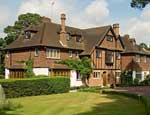Overseas buyers snapping up country houses
Buyers from abroad now account for around 30% of country house sales in the UK


Exquisite houses, the beauty of Nature, and how to get the most from your life, straight to your inbox.
You are now subscribed
Your newsletter sign-up was successful
When the classic Queen Anne Cotswolds manor Bourton House was launched on the market in Country Life on September 23 for £4.5 million, it immediately generated intense interest among potential buyers. After just five weeks on the market, the house went to competitive bids, with not one but both the leading interesting parties hailing from overseas.
Over the past four years, nearly a third of buyers in the £4 million-plus country-house market have come from overseas and, according to Savills, in that same period, the number of overseas buyers has exceeded the number of overseas sellers by a factor of two. ‘We're not saying that overseas buyers are taking over the market at the top end: 70% of buyers of £4 million country houses are still from the UK, but we've witnessed a creeping international element into this market,' explains Lucian Cook, director of Savills Research.
Traditionally, overseas buyers haven't strayed far beyond the confines of central London-even the most adventurous have usually hemmed in their scope to within the M25. Then, a few Russians were lured by Lutyens-style houses in villages near Godalming in Surrey, and today, bar the odd anomaly in Cornwall and Gloucestershire, the heaviest concentration remains in the South-East around the honeypot Surrey and Berkshire suburbs. But the attraction of owning a country house is gaining favour with other nationalities. Jonathan Bramwell of Prime Purchase has also noticed a marked increase in the number of Chinese buyers over the past nine months.
‘And by that, I mean mainland Chinese, not Hong Kong Chinese. But they want to be within an hour of Heathrow-as well as good restaurants-and are unlikely to widen their search beyond south Oxfordshire.' ‘It's certainly been a phenomenon of this past decade,' explains Crispin Holborow, head of country houses at Savills.
‘In the 1990s, we saw Middle Eastern buyers moving out of London, but one of the things we'll remember about this decade has been the widening of interest from different nationalities for country houses.' Analysing the demand for country houses in the £4 million-plus bracket over the past four years, Savills have highlighted the number of different nationalities now represented in the country-house market.
According to these statistics, a greater percentage of buyers at the very top end of the country-house market are South African than either more headline-grabbing Middle Eastern or Russian buyers (which includes Eastern European). ‘We've acted for quite a few South African clients buying in Gloucestershire, Oxfordshire and Berkshire in the past three years,' says Edward Sugden of buying agents Property Vision. ‘There's a feeling that England is a safe place to bring up and educate their children as well as retire.'
Education remains the primary attraction for international buyers spreading their wings further into the countryside. ‘Remember, in the old days at boarding school, from the start of term you were only allowed out at once or twice for the entire three-month period,' says Jonathan Bramwell of Prime Purchase. ‘Nowadays, most children come out every weekend, which means that overseas buyers need to have a base to stay within an hour or so of the school. That's led to a definite increase in foreigners buying country houses.' He attributes the rise in demand to the increase of satellite schools that have been set up in the Far East and elsewhere in the past 20 years. ‘They've done a good job at spreading the word on the value of a British public-school education on a local level.'
Exquisite houses, the beauty of Nature, and how to get the most from your life, straight to your inbox.
What the statistics don't best demonstrate is the divergence in tastes between the nationalities. Although Asian, Eastern European and Middle Eastern country-house buyers remain in the South-East, those from Europe, North America and South Africa are cropping up in areas further afield, possibly because of an interest in country pursuits or just a desire to adopt the rural lifestyle. ‘They might have started with a house in London and then, the more time they've spent in this country, the more they've acquired a greater understanding of the countryside,' believes Mr Holborow.
‘It'll be interesting to see whether any announcements in the pre-budget speech affect the sentiments behind these international buyers,' says Mr Holborow. ‘But the pre-eminence of London as a financial centre almost ensures that they will continue to want to have a base here, regardless of changes to taxation laws. Looking back 10 years, there was a discussion over whether Frankfurt was going to take over from London, but that's no longer a plausible threat.'
Buyer nationality of UK properties over £4 million
UK 70%
Other Europe 10%
India 4%
USA 1%
Middle East 3%
Eastern Europe/Russia 3%
Southern Africa 4%
Far East 1%
Other 4%

